by Farley Webmaster | Aug 1, 2024
In today’s competitive real estate market, finding innovative ways to sell your home quickly and at the best possible price is crucial. One such strategy is utilizing a Private Exclusive Listing with Compass. This approach offers numerous benefits to both sellers and buyers, making it a valuable tool in your real estate arsenal. Here are the top 10 advantages of a Private Exclusive Listing with Compass:
1. Generate Pre-Market Excitement
When you list your home as a Private Exclusive with Compass, you create pre-market excitement. This strategy allows you to start building demand for your property while it is being prepared for the public market. It gives potential buyers a sneak peek, generating buzz and anticipation.
2. Test at an Aspirational Price
A Private Exclusive Listing lets you test your property at an aspirational price without the risk of accruing days on market (DOM) or public price drops. This means you can gauge interest and gather feedback on your price point without impacting your property’s market history on MLS and Zillow.
3. Avoid Accruing Days on Market
One of the most significant benefits of a Private Exclusive Listing is that it prevents unnecessary days on market. Listings that sit too long can appear stale and reduce a property’s perceived value. By keeping your property as a Private Exclusive, you ensure it doesn’t suffer from this potential drawback.
4. Tailor Marketing to Buyer Preferences
Private Exclusive Listings provide valuable insights into what buyers find most appealing about your property. For example, while you might think the pool is the main selling point, feedback from other agents during the Private Exclusive period might reveal that the first-floor bedroom is more important. This feedback allows you to tailor your marketing efforts to highlight the features that matter most to buyers.
5. Create a Sense of Exclusivity
Buyers often feel privileged to view a property that is not yet on the public market. This sense of exclusivity can lead to highly attractive offers as buyers strive to secure the property before it goes public. Letting buyers know the property will be listed publicly on a specific date can drive urgency and competitive offers.
6. Flexibility for Future Listing
If you’re not ready to list your property for several months, a Private Exclusive Listing allows you to market your home at an aspirational price without accruing days on market or disclosing price history. This flexibility can attract interested buyers willing to agree to a later closing date, accommodating your timeline.
7. Maintain Privacy and Security
For sellers concerned about privacy or security, a Private Exclusive Listing offers peace of mind. The general public won’t see photos or floorplans of your home, as the listing is only viewable to Compass agents. You have complete control over the information shared, ensuring your privacy is protected.
8. Create Excitement Like a Movie Trailer
Think of your Private Exclusive Listing as a Hollywood movie trailer. Just as trailers build anticipation for an upcoming film, a Private Exclusive Listing generates excitement for your property before it officially hits the market. This strategy helps build momentum and interest without impacting your marketing timeline or days on market.
9. Promote While Preparing Your Home
While you’re busy painting, staging, and preparing your home for sale, a Private Exclusive Listing allows you to start promoting your property. This early promotion signals to the market that something special is coming soon, building anticipation and potential interest before your home is publicly listed.
10. Reduce Public Market Days
By initially listing your property as a Private Exclusive, you can reduce the days it spends on the public market. Since you’ve already gathered feedback and made adjustments, your listing will be better positioned for success when it goes public. This approach can lead to a quicker sale and potentially higher offers.
Why Work with a Compass Agent?
Working with a Compass agent provides you access to these innovative strategies and the expertise needed to navigate the real estate market effectively. Compass agents are skilled in leveraging Private Exclusive Listings to maximize your property’s potential and ensure you achieve the best possible results. Whether you’re selling or buying, a Compass agent’s knowledge and experience can make all the difference in your real estate journey.
In conclusion, a Private Exclusive Listing with Compass offers numerous advantages that can enhance your selling or buying experience. By generating pre-market excitement, avoiding unnecessary days on market, and providing valuable feedback for tailored marketing, this strategy ensures your property is positioned for success. Trust a Compass agent to guide you through this process and achieve your real estate goals.
If you have any questions or are interested in exploring the benefits of a Private Exclusive Listing further, please feel free to contact us. We’re here to help you make the most informed and strategic decisions in your real estate journey.
by Farley Webmaster | Apr 30, 2024
Improving your home’s value doesn’t necessarily require extensive renovations or a large budget. Strategic updates can make your property more appealing to potential buyers, leading to a higher selling price. Here are several budget-friendly tips for homeowners looking to increase the value of their homes:
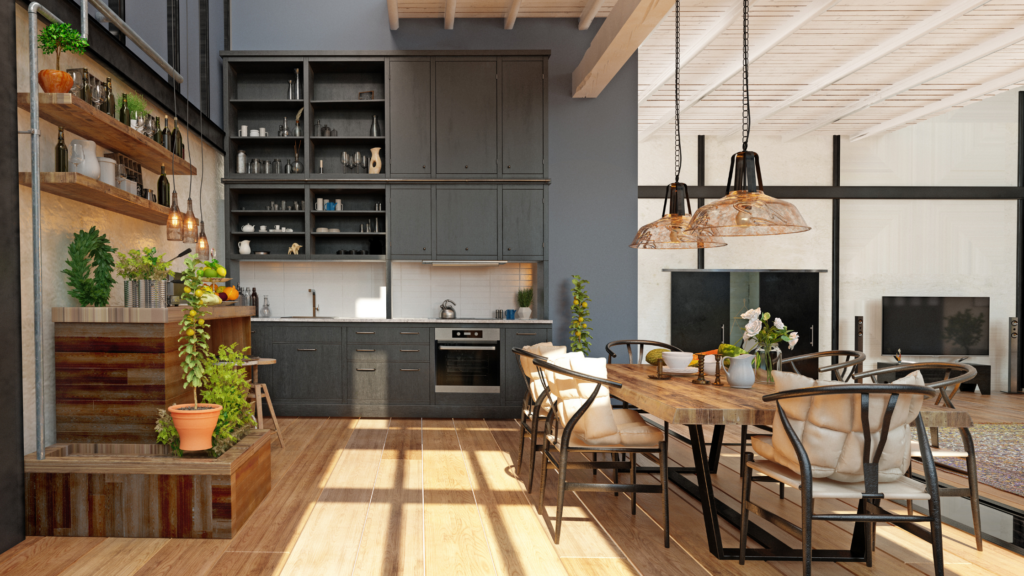
1. Paint to Impress
A fresh coat of paint in modern, neutral colors can transform a home’s appearance. Colors like soft gray, beige, and off-white create a bright, airy feel, making rooms appear larger and more inviting. This simple update can greatly influence buyers’ first impressions.
2. Update Fixtures
Replacing outdated fixtures in kitchens and bathrooms can modernize these important spaces without a full remodel. Consider updating faucets, drawer pulls, and lighting fixtures to contemporary styles that appeal to a wide range of buyers.
3. Enhance Curb Appeal
Curb appeal is crucial in creating a strong first impression. Simple changes such as updating the front door, adding fresh mulch, maintaining the lawn, and installing new outdoor lighting can make a significant difference. Small additions like new house numbers, a modern mailbox, or potted plants can also enhance the entrance.
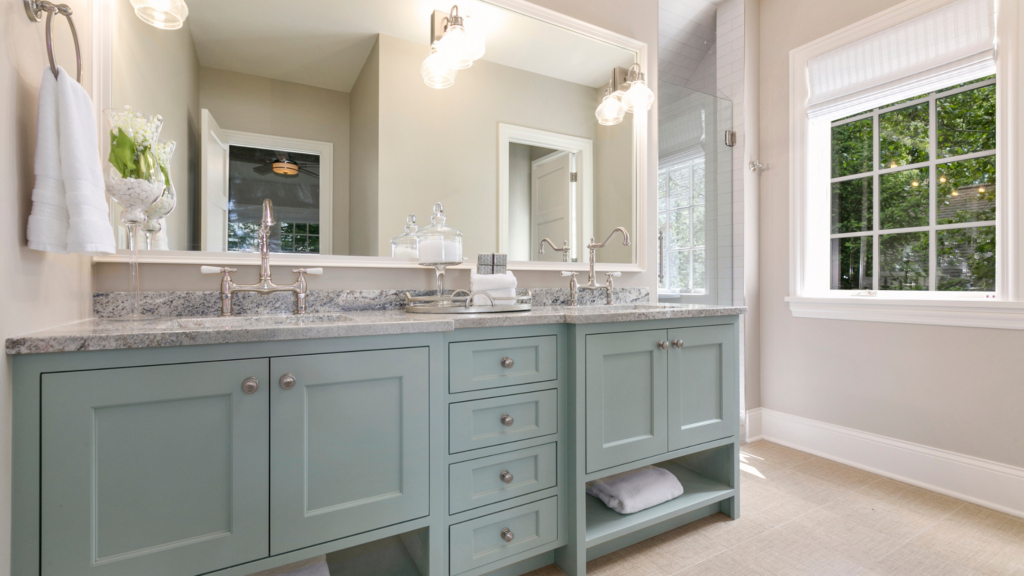
4. Modernize Cabinet Hardware
Refreshing kitchen and bathroom cabinets with new hardware is a cost-effective way to update the overall look of these rooms. Choose stylish, durable knobs and pulls that complement the existing cabinetry for a cohesive and polished appearance.
5. Focus on Flooring
Replacing old, worn-out carpeting with hardwood or laminate flooring can increase a home’s appeal and value. If new flooring isn’t in the budget, consider professional carpet cleaning or refinishing existing hardwood floors to rejuvenate them.
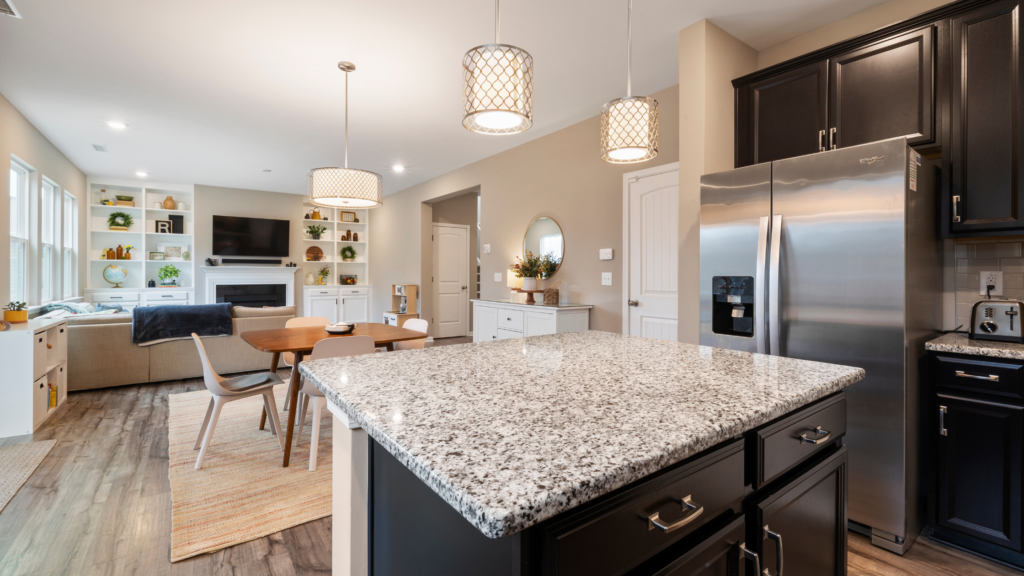
6. Upgrade Lighting
Good lighting can change the feel of a home. Replacing old fixtures with modern, energy-efficient lighting not only brightens spaces but also reduces energy costs—a selling point for today’s environmentally conscious buyers.
7. Invest in Landscaping
Attractive landscaping can boost curb appeal and make a property feel more inviting. Budget-friendly landscaping projects might include planting native flowers and shrubs, adding bark mulch, and keeping the lawn trimmed and green.
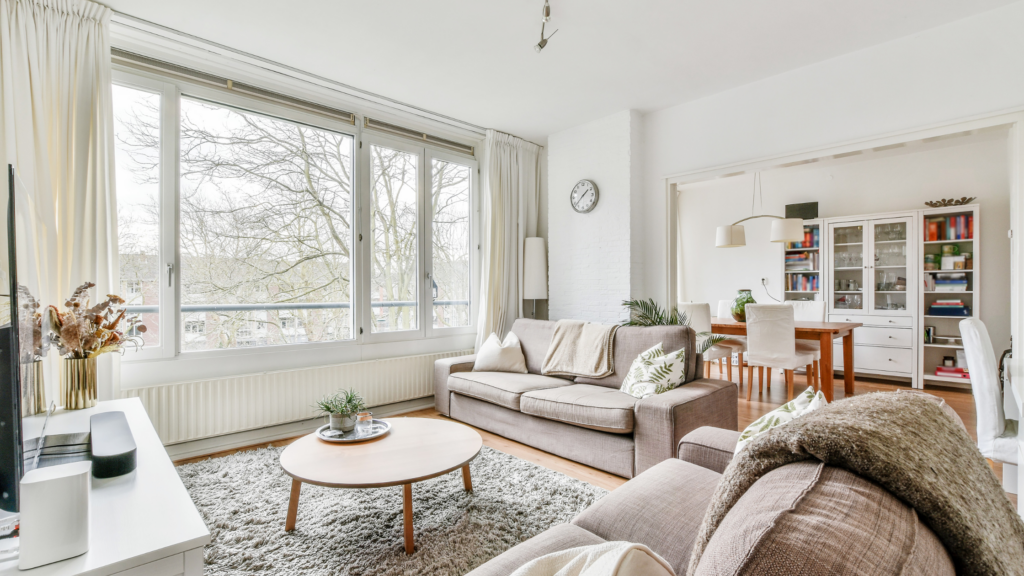
8. Declutter and Clean
A clutter-free and clean home is more appealing to buyers. It helps them visualize their own belongings in the space. Consider renting a storage unit for excess belongings and deep cleaning the house, including windows, gutters, and surfaces.
9. Smart Home Upgrades
Incorporating smart home technology such as thermostats, smoke detectors, and security systems can be a selling point, especially in markets that attract tech-savvy buyers. These features offer convenience and can be energy cost savers.
10. Address Maintenance Issues
Ensure that all minor repairs are taken care of before listing the home. Fixing leaky faucets, patching holes in walls, and ensuring all appliances work correctly can prevent buyers from being deterred by small issues during showings.
Improving your home’s value on a budget requires strategic choices that maximize appeal to potential buyers. By focusing on key areas such as aesthetics, functionality, and modernization, homeowners can significantly enhance their property’s marketability and selling price. When in doubt about which renovations will have the biggest impact, consulting a local real estate expert can provide insights tailored to your specific market conditions. This proactive approach not only prepares your property for a successful sale but also ensures a good return on your investment.
by Farley Webmaster | Dec 17, 2023
The coming new year brings new beginnings and fresh opportunities. If you’re considering selling your home in this promising time, it’s essential to begin preparations now so that it can stand out in the real estate market once listed. Our guide will walk you through expert tips to prep your home for a successful sale.
Initial Consultation and Comparative Market Analysis (CMA)
The first step in your home-selling journey should be a consultation with a real estate professional. Understanding the current market landscape is crucial. A professional provides a detailed comparative market analysis (CMA), giving you a clear picture of your home’s potential in the current market. This analysis will serve as the foundation of your selling strategy. A thorough CMA includes:
- Comparable Properties: This is a list of recently sold properties that are similar to the subject property in terms of location, size, condition, and features. These are often referred to as “comps.”
- Current Market Listings: The CMA also looks at properties currently listed for sale in the area. This gives an idea of the competition and helps in understanding current market trends.
- Pending Sales: These are properties that are under contract but have not yet closed. This information can provide insights into the current demand and potential future market trends.
- Expired Listings: Listings that did not sell while they were on the market. Analyzing why these properties didn’t sell can offer valuable insights into pricing and marketing strategies.
- Property Adjustments: Adjustments may be made for differences between the subject property and the comps, such as the number of bedrooms and bathrooms, square footage, lot size, property condition, and unique features or upgrades.
- Market Trends and Conditions: Analysis of broader market trends, such as whether it’s a buyer’s or seller’s market, average days on market, sale-to-list price ratios, and seasonal trends.
- Location Analysis: Evaluation of location-specific factors like school districts, neighborhood amenities, and proximity to desirable features like parks or shopping centers.
- Historical Data: Past sale prices of the subject property and comparable properties, which can provide context for how the area’s market has evolved.
- Price Per Square Foot: Comparison of the price per square foot between the subject property and comparable sales.
- Visual Data and Maps: Maps and visual data showing the location of the subject property in relation to the comps, which can highlight location desirability.
- Recommendations for Pricing and Selling: Based on the analysis, the CMA usually concludes with a recommended price range for listing the property and may include suggestions for pre-sale improvements or staging.
A well-conducted CMA provides a solid foundation for setting a competitive and realistic price for a property, tailored to the specifics of the local market and the unique characteristics of the property itself.
Creating a Game Plan for Listing
Every home is unique, and so is every selling journey. Your real estate agent specializes in creating a personalized game plan for your listing. They will help you pinpoint the ideal time to list your home, considering both market conditions and your personal timeline. They will then help you understand what you can do to maximize the value of your home and provide guidance on how to prep your space for listing day.
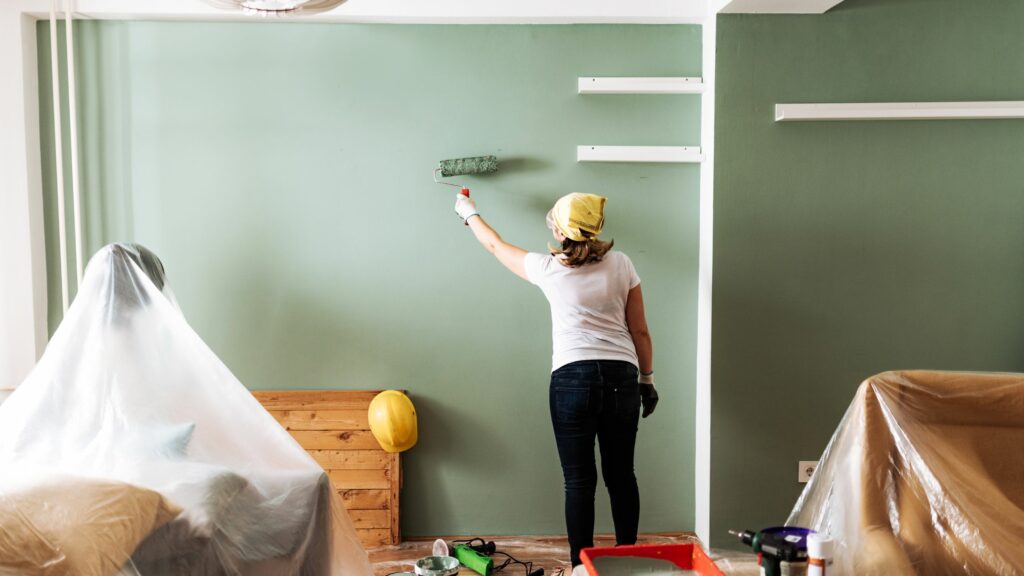
Preparing Your Home
Repairs and Upgrades
- Energy Efficiency: Upgrading to energy-efficient appliances or adding smart home features can be a selling point, especially among environmentally conscious buyers.
- Fix the Basics: Address all minor repairs such as leaky faucets, squeaky doors, or chipped paint. These small fixes can make a big difference in the overall appeal.
- Consider Cosmetic Upgrades: Evaluate if certain key areas like the kitchen or bathroom could benefit from cosmetic upgrades. Simple changes like new cabinet handles, modern light fixtures, or a fresh coat of paint can be cost-effective yet impactful. Things like a kitchen upgrade can have a 67% return on investment. (Architectural Digest)
Curb Appeal
- Landscaping: Keep your lawn manicured and add some fresh mulch to garden beds. Consider planting seasonal flowers for a pop of color.
- Exterior Maintenance: Clean your home’s exterior, including windows, gutters, and siding. A well-maintained exterior suggests a well-maintained interior. Have your roof inspected and repaired to avoid costly issues during the sale – a new roof, along with a new garage door, can have a 100% return on investment. (Architectural Digest)
- Welcoming Entryway: Make the entryway inviting with a clean doormat, potted plants, and a fresh coat of paint on the front door if needed.
Declutter
- Clutter-Free Spaces: Start by removing excess items from all areas of your home. This includes clearing off countertops, thinning out crowded bookshelves, and minimizing personal items like family photos and keepsakes. The goal is to create a spacious and inviting environment that buyers can picture themselves living in.
- Storage Solutions: Use storage solutions smartly. Organize closets and cabinets as potential buyers often look inside. A tidy and well-organized space can leave a positive impression.
- Safety: Ensuring that areas are clutter-free enhances the safety of your home. Having everything neatly organized and tucked away reduces tripping hazards. If you’re living in the home while showing it and space is limited, getting a storage space for a brief time can give you a safe place to store the items.
Final Touches
- Deep Clean: Consider a professional deep cleaning service before you begin welcoming potential buyers. A spotless home makes a strong impression.
- Neutralize Odors: Remove sources of bad odor and consider subtle air fresheners. Avoid strong scents as they can be off-putting to some people.

Marketing Your Home
With your home now meticulously prepared for the market – decluttered, repaired, and deep cleaned – the next pivotal phase begins: marketing your property and navigating the period it is listed. This is where your partnership with your real estate agent becomes even more instrumental. You and your agent will develop a customized marketing plan. This strategy should reflect your home’s unique features and align with current market trends. Essential pieces of this plan will include how to showcase your home in the best possible light, including:
Home Staging
- Room Purpose: Ensure each room has a clear purpose. If you’ve been using a spare bedroom as storage, consider setting it up as a guest room or office.
- Furniture Layout: Arrange furniture to maximize space and flow. Remove oversized or excess furniture that makes spaces feel cramped. If the home will be empty during the sale, consider hiring a staging company to furnish the home and create a warm and inviting space. Professionally staged homes sell for an average of $40,000 over the list price, based on a 2021 market survey. (RESA)
- Neutral Decor: Opt for neutral colors and simple decor to appeal to a wide range of buyers. Bright, bold colors might distract or deter potential buyers.
- Professional Photography: Hire a Professional: Professional photographers understand how to make spaces look inviting and spacious. Their skills can significantly enhance the appeal of your listing.
- Prepare for the Shoot: Ensure your home is clean, well-lit, and staged before the photography session. Open curtains to let in natural light and turn on all indoor lights to create a bright, welcoming atmosphere.
Navigating The Listing Period
Selling a home is a dynamic process, and the period your home is listed is critical. By working closely with your real estate agent to craft and execute a robust marketing strategy, and by staying adaptable and responsive throughout the listing period, you can navigate this phase effectively, increasing your chances of a successful and satisfactory sale.
- Maintaining Your Home’s Appeal: Keep your home in show-ready condition. This means regular cleaning, tidying, and ensuring that any temporary issues (like pet odors or clutter) are promptly addressed.
- Flexibility with Showings: Be as flexible as possible with showing times. The more accessible your home is to potential buyers, the higher the chances of receiving offers.
- Receiving Feedback: Your agent will gather feedback from showings and open houses. Be open to this feedback as it can provide valuable insights into the buyers’ perspectives and suggest potential areas for improvement.
- Adjusting Strategy if Needed: If the market responds differently than expected, be prepared to adjust your strategy. This could involve tweaking your asking price, enhancing your marketing materials, or making additional minor improvements to your home.
- Communicating Regularly with Your Agent: Maintain regular communication with your agent throughout the listing period. They will keep you updated on the market’s response, potential buyer interest, and any necessary strategy adjustments.
Selling your home is a significant decision, and early preparation is key. By partnering with an expert real estate professional, like John Farley, you gain not just a realtor but a strategic partner in your home-selling journey. Contact John today to start crafting your personalized roadmap to a successful sale.
by Farley Webmaster | Jun 20, 2023
When it comes to selling your home, first impressions matter. Properly staging your property can significantly increase its appeal to potential buyers, resulting in a quicker and more successful sale. In this blog post, we will explore effective home staging tips that will help you showcase your property in the best possible light. By following these expert strategies, you can create a welcoming and enticing environment that will capture buyers’ attention and expedite the selling process.
Declutter and Depersonalize
One of the fundamental aspects of home staging is decluttering and depersonalizing your space. Remove excess furniture, personal items, and knick-knacks to create a clean and spacious atmosphere. Potential buyers want to envision themselves living in the house, so it’s essential to minimize distractions and allow them to focus on the property’s features.
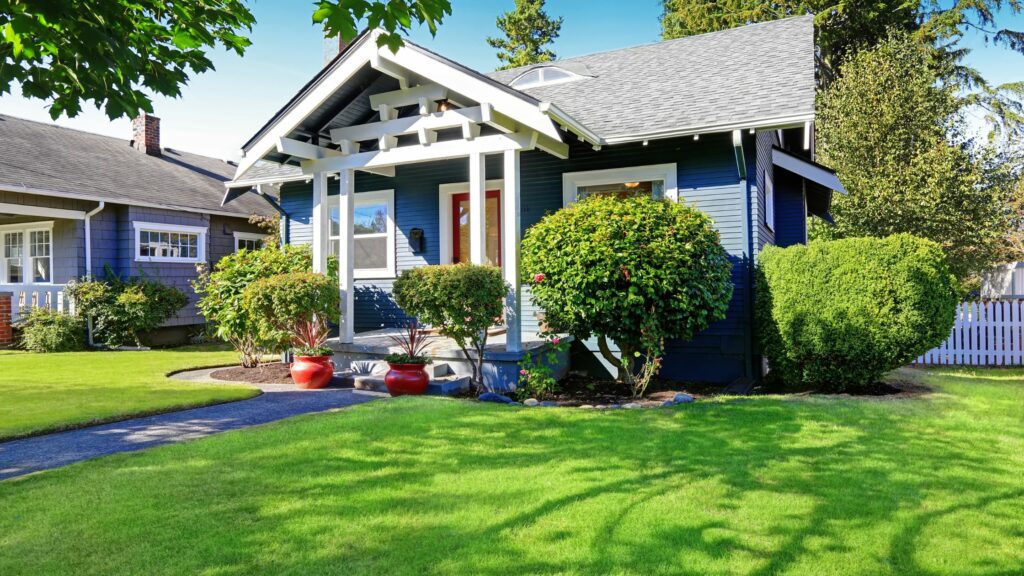
Home Staging Tips: Enhance Curb Appeal
Enhance Curb Appeal
First impressions begin at the curb, so make sure your home’s exterior is inviting and well-maintained. Trim the lawn, plant colorful flowers, and apply a fresh coat of paint to the front door to create an appealing facade. Adding some outdoor furniture or potted plants can also enhance the overall curb appeal and create an inviting atmosphere.
Maximize Natural Light
Lighting can significantly impact the perception of a space. Open curtains and blinds to let in as much natural light as possible. If necessary, clean windows to maximize brightness and remove any obstructions that could hinder the entry of natural light. Well-lit rooms feel more spacious and inviting, increasing the overall appeal of your home.
Neutralize Colors and Decor
While you may love bold colors and unique decor, it’s best to opt for neutral tones and styles when staging your home. Neutral colors create a blank canvas that allows potential buyers to envision their own furniture and personal style in the space. Consider repainting walls in soft, neutral hues and using neutral-colored furnishings and decor to create a universally appealing aesthetic.
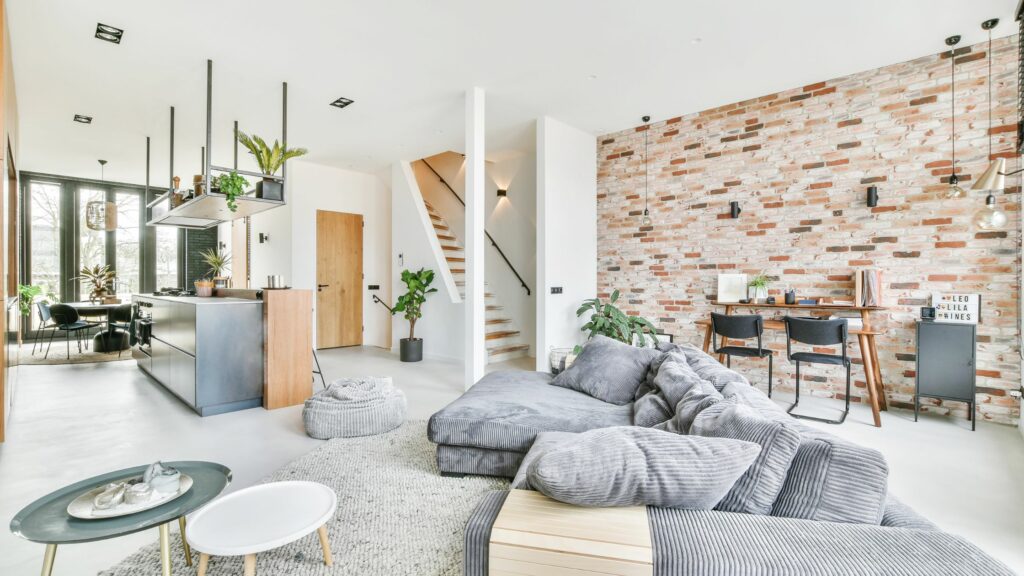
Home Staging Tips: Focus on Key Rooms like the Living Room
Focus on Key Rooms
Certain rooms have a more significant impact on buyers than others. Pay extra attention to staging the living room, kitchen, and master bedroom. These areas tend to be the focal points of a home, and creating a warm, inviting atmosphere can leave a lasting impression. Rearrange furniture to create conversational seating arrangements, add fresh flowers, and incorporate tasteful decor to highlight the room’s best features.
Highlight Functional Spaces
Today’s buyers often look for homes that offer functionality and versatility. Showcase any multifunctional spaces in your home to demonstrate its potential. Convert an underutilized corner into a cozy reading nook or transform a spare room into a home office. By showing buyers how they can adapt the space to their needs, you increase the value and desirability of your property.
Create a Welcoming Ambiance
During showings or open houses, create a warm and inviting ambiance throughout the home. Play soft background music, use scented candles or air fresheners with subtle fragrances, and add plush, comfortable textures through throw pillows and blankets. These small touches create a pleasant sensory experience and make potential buyers feel at ease while exploring your property.
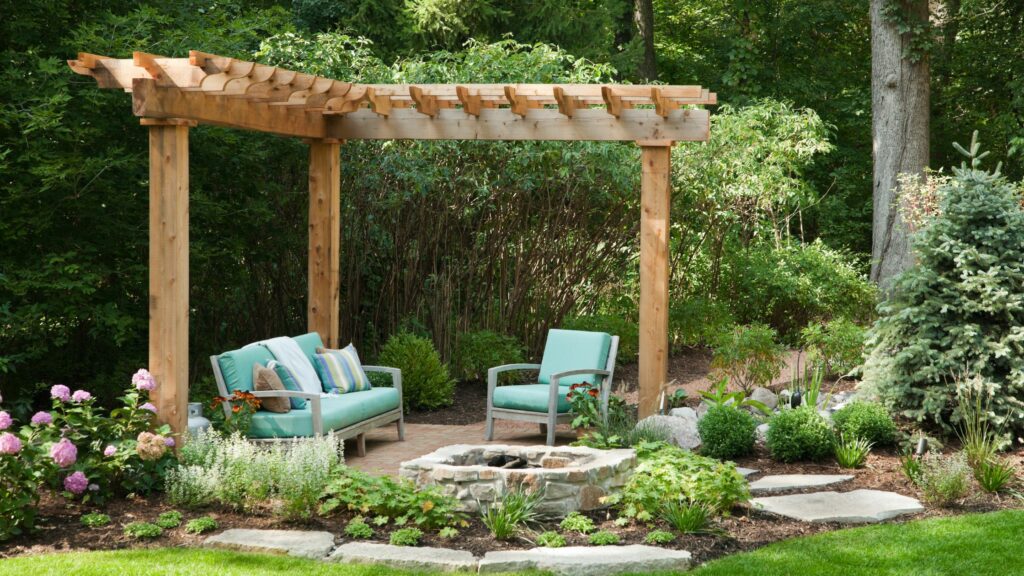
Home Staging Tips: Enhance the Appeal of Outdoor Spaces
Enhance the Appeal of Outdoor Spaces
Outdoor areas can significantly contribute to a home’s overall appeal. Stage outdoor spaces such as patios, decks, and gardens to showcase their potential for relaxation and entertainment. Arrange outdoor furniture, add cushions and throw pillows, and set up a cozy outdoor dining area. Enhancing these spaces extends the living area of your home and allows buyers to envision enjoying outdoor activities in their new property.
Pay Attention to Details
In the staging process, don’t overlook the importance of paying attention to details. Replace outdated fixtures, repair any visible damages, and ensure that every room is spotlessly clean. Small details like fresh flowers, art on the walls, or a well-placed mirror can make a significant difference in elevating the overall aesthetic appeal of your home.
Professional Photography and Virtual Tours
In today’s digital age, quality visuals are crucial for attracting potential buyers. Hire a professional photographer to capture high-quality images of your staged home. These photos will be used for online listings, brochures, and marketing materials. Additionally, consider offering virtual tours to allow remote buyers to experience the property virtually, providing them with an immersive and detailed viewing experience.
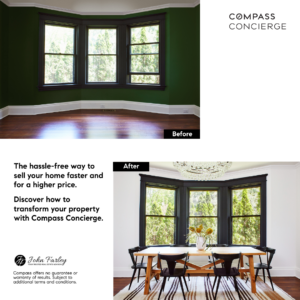
Effective home staging can be the key to a successful and swift sale of your property. By implementing these staging tips, you can create an inviting and appealing environment that captures buyers’ attention and helps them envision their future in your home. Remember to declutter, neutralize colors, enhance curb appeal, and pay attention to details. When you work with John Farley Real Estate, you have exclusive home selling tools at your disposal, such as Compass Concierge. Compass Concierge offers sellers a unique opportunity to access professional staging services and other home improvement services without any upfront costs. By leveraging this program, sellers can enhance their homes, attract more buyers, and potentially sell their properties faster and at a higher price. With careful planning and execution, your staged home will stand out in the market, attract potential buyers, and increase your chances of a quick and successful sale.
Reach out to the John Farley team today if you’re ready to sell your home and want to ensure it sells quickly and for top dollar!










